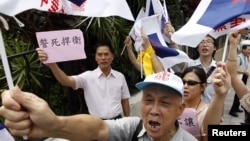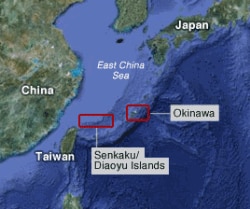TAIPEI —
A tiny group of islands in the East China Sea has shaped up as a flashpoint between Beijing and Tokyo. But smaller and diplomatically isolated Taiwan also claims the disputed Senkaku archipelago, which it calls the Diaoyutai. In Taipei, authorities have shied away from confrontation, while seeking to play a larger role in resolving the conflict.
On Tuesday, Taiwanese officials urged Japan and China to back down from a conflict about the Senkaku islets, some 220 kilometers from Taiwan.
Taiwan wants Japan to resume talks, after 16 earlier rounds, on fishing rights in waters near the uninhabited islets. Taiwan also asked the other claimants to consider Taiwanese President Ma Ying-jeou’s proposal for setting aside their territorial disputes to explore jointly for resources.
Foreign Minister Timothy Yang told a news conference in Taipei that he is worried that the conflict will spiral. He says it is easy to escalate a conflict and harder to make peace. But Yang calls Taiwan a peacemaker for the international community and says that, in face of the East China Sea developments, the president has formulated a peace initiative. He adds that Ma is urging all sides to restrain themselves, set aside disputes, solve conflicts in a peaceful way and develop East China Sea resources together.
The minister’s words reflect what analysts call the government’s underlying motives for seeking a broader role in the dispute. When President Ma took office in 2008, he said that despite diplomatic isolation Taiwan would try for more informal participation in international affairs. Taiwan is self-ruled, but China has claimed sovereignty over the island since the 1940s and uses its economic clout now to keep Taiwan out of international bodies such as the United Nations.
Ma’s foreign policy mission has produced few tangible results, adding pressure from the public to make good on his word. Taiwan’s fishermen who have traditionally trawled near the disputed islets, tend to favor Taiwan’s populist chief opposition party, adding pressure on the president to reach a deal with Japan.
At the same time, Taiwan aims to maintain friendly ties with both Japan and China. Since 2008, Ma’s government has sought to shelve the sovereignty issue to make trade and investment deals with Beijing, boosting the local economy. China’s leaders hope those non-political agreements will nudge Taiwan’s population toward eventual unification.
Taiwan’s population also is not seeking a fight with the island’s former colonizer, Japan. Japanese culture is popular in Taiwan, where many people look to the country for fashion, food and urban planning cues. Japan also remains a top tourist destination for Taiwanese.
Last week, thousands of people have participated in anti-Japan protests against Tokyo’s purchase of the islands from a private citizen. Beijing largely stands by its angry citizens, calling their anger toward Tokyo irrepressible.
But in Taiwan, protests have been rare and involved just a handful of people.
Taiwan’s foreign minister added on Tuesday that the president’s peace initiative would only set aside the Diaoyutai Islands sovereignty disputes, not solve them. He says Taiwan rightfully owns the islands and will not change its position.
On Tuesday, Taiwanese officials urged Japan and China to back down from a conflict about the Senkaku islets, some 220 kilometers from Taiwan.
Taiwan wants Japan to resume talks, after 16 earlier rounds, on fishing rights in waters near the uninhabited islets. Taiwan also asked the other claimants to consider Taiwanese President Ma Ying-jeou’s proposal for setting aside their territorial disputes to explore jointly for resources.
Foreign Minister Timothy Yang told a news conference in Taipei that he is worried that the conflict will spiral. He says it is easy to escalate a conflict and harder to make peace. But Yang calls Taiwan a peacemaker for the international community and says that, in face of the East China Sea developments, the president has formulated a peace initiative. He adds that Ma is urging all sides to restrain themselves, set aside disputes, solve conflicts in a peaceful way and develop East China Sea resources together.
The minister’s words reflect what analysts call the government’s underlying motives for seeking a broader role in the dispute. When President Ma took office in 2008, he said that despite diplomatic isolation Taiwan would try for more informal participation in international affairs. Taiwan is self-ruled, but China has claimed sovereignty over the island since the 1940s and uses its economic clout now to keep Taiwan out of international bodies such as the United Nations.
Ma’s foreign policy mission has produced few tangible results, adding pressure from the public to make good on his word. Taiwan’s fishermen who have traditionally trawled near the disputed islets, tend to favor Taiwan’s populist chief opposition party, adding pressure on the president to reach a deal with Japan.
At the same time, Taiwan aims to maintain friendly ties with both Japan and China. Since 2008, Ma’s government has sought to shelve the sovereignty issue to make trade and investment deals with Beijing, boosting the local economy. China’s leaders hope those non-political agreements will nudge Taiwan’s population toward eventual unification.
Taiwan’s population also is not seeking a fight with the island’s former colonizer, Japan. Japanese culture is popular in Taiwan, where many people look to the country for fashion, food and urban planning cues. Japan also remains a top tourist destination for Taiwanese.
Last week, thousands of people have participated in anti-Japan protests against Tokyo’s purchase of the islands from a private citizen. Beijing largely stands by its angry citizens, calling their anger toward Tokyo irrepressible.
But in Taiwan, protests have been rare and involved just a handful of people.
Taiwan’s foreign minister added on Tuesday that the president’s peace initiative would only set aside the Diaoyutai Islands sovereignty disputes, not solve them. He says Taiwan rightfully owns the islands and will not change its position.





